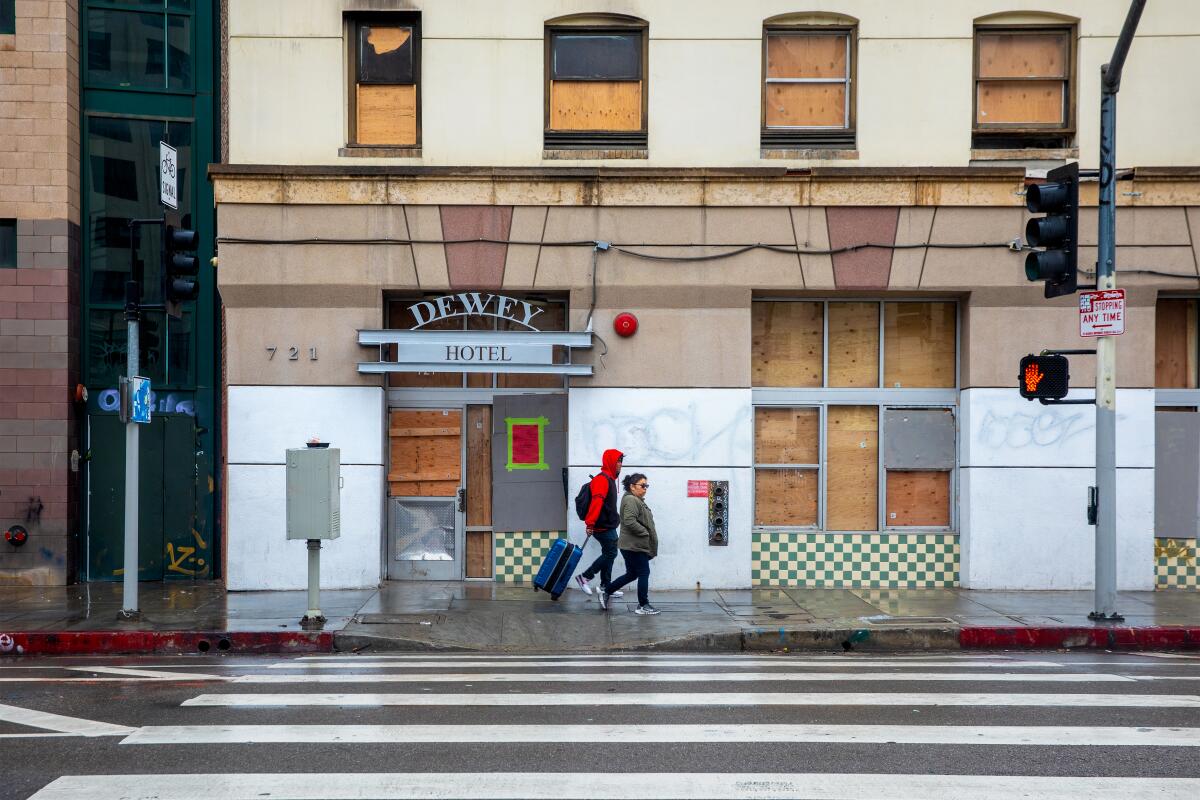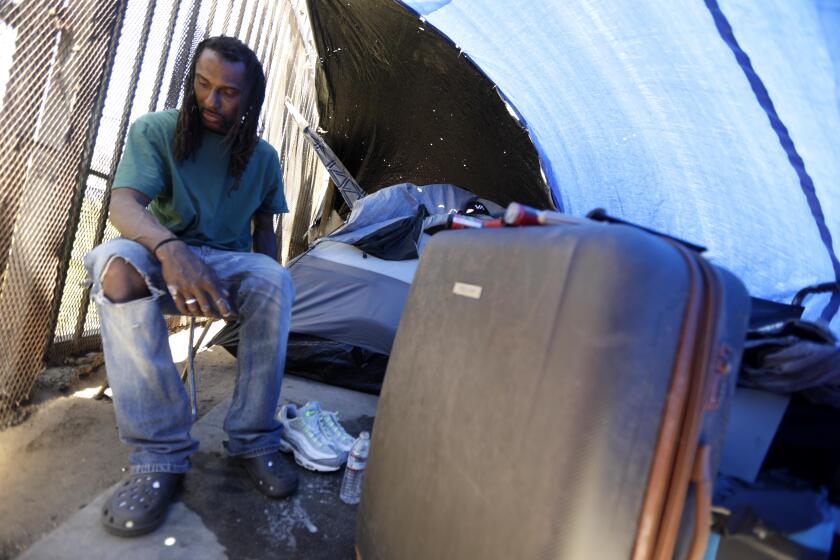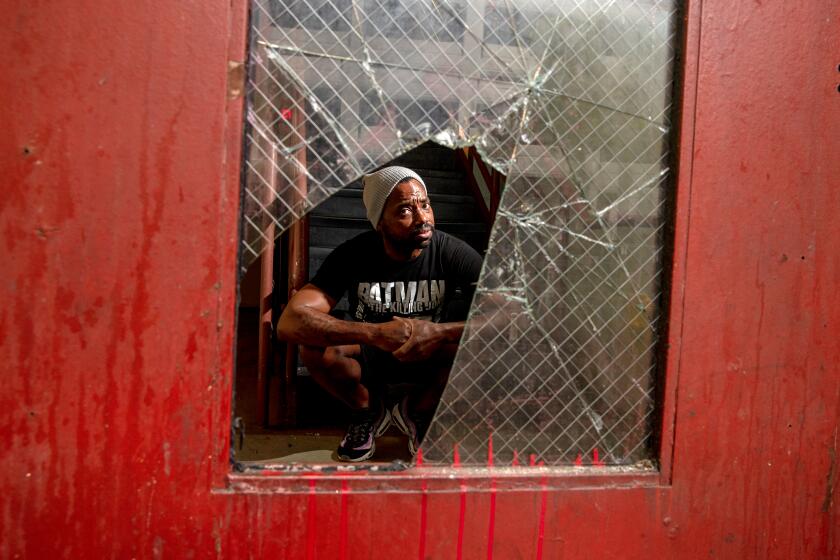All 29 Skid Row Housing Trust buildings placed under receivership

- Share via
All 29 buildings operated by the nonprofit Skid Row Housing Trust have been placed into receivership after many of them fell into extreme disrepair and reports of drug use became widespread.
The city of Los Angeles petitioned for the receiver, a neutral third party that helps manage and restore blighted properties.
At a hearing Friday, L.A. Superior Court Judge Mitchell L. Beckloff appointed Mark Adams, president of California Receivership Group, as the receiver. Adams’ company specializes in court-ordered abatement of abandoned and dilapidated properties, according to its website.
The ruling comes two days after three people died of drug overdoses in an apartment unit at a Skid Row Housing Trust building, 649 Lofts.
Fatal drug overdose like those this week at 649 Lofts are becoming “the norm,” according to skid row residents, who are calling on city officials to do more to stop fentanyl overdoses.
Joanne Cordero, the trust’s interim chief executive, said the ruling was a first step in providing much-needed help to its workers as well as the tenants.
“We have been clear with our stakeholders that more resources are needed urgently, and the city’s action will help bring those resources to the table,” she said. “We are collaborating fully with the receiver.”
The Times recently revealed the appalling living conditions at the trust’s properties and the depth of mismanagement and financial disarray that led to the collapse of an institution that had long stood as a model for housing homeless people.
The trust’s breakdown was caused in part by a challenging financing model for the housing stock it set out to save — single room occupancy buildings that it had bought to preserve as low-income housing.
But budgetary shortfalls and soaring maintenance costs to keep aging buildings habitable took a financial toll. Some of the people the nonprofit served had substance abuse and other issues that could lead them to damage buildings and inflict chaos on residents. Financial mismanagement and a lack of stable leadership worsened the trust’s problems.
The Skid Row Housing Trust was a model for nonprofits housing homeless people in Los Angeles. Behind the scenes, it was imploding — leaving tenants in squalor.
Lawsuits filed last year on behalf of 67 tenants in two buildings — the Hart and St. Mark’s — alleged uninhabitable conditions including pest infestations, damaged flooring, electrical problems, broken windows and doors.
St. Mark’s residents alleged a lack of security, violence by other tenants and intimidation by staff.
Residents of the Hart alleged that they frequently had to use buckets as toilets.
The Times found similar issues in other buildings where tenants said that drug use and prostitution were a problem. They put the blame on lax security that gave intruders easy access.
Los Angeles housing officials are planning to step in with immediate help to stabilize residential buildings that the financially strapped Skid Row Housing Trust is unable to maintain in habitable condition.
Earlier this year, Cordero said the trust could no longer support its residential buildings — many of which were operating in the red — and sought other fiscally stable organizations to take them over.
The city moved to place the buildings in receivership out of concern for the health and safety of the tenants.
In a written statement, City Atty. Hydee Feldstein Soto described the trust’s 1,500 tenants as “among the most vulnerable people in our City, requiring health services, security and daily assistance.”
“I am extremely proud of the legal professionals at every level in my office who worked nonstop to bring this to fruition and look forward to the new receiver getting to work immediately,” she said.
Beckloff initially considered placing 26 of the buildings into receivership while awaiting evidence of substandard conditions at the other three.
He included all 29 properties after Alia Haddad, a deputy city attorney, cited the recent overdose deaths and worsening conditions for the building’s tenants.
“We’re seeing the train going off the cliff over here,” Haddad said at Friday’s hearing. “My concern is if we’re unable to place all the properties under receivership, we’re heading toward similar results, and ... it would make a lot of sense to avert further catastrophe.”
The rescue plan relies on a seldom-used provision in the state health and safety code that allows a court-appointed receiver to borrow against distressed properties to rehabilitate them.
Adams’ company advertises on its website that no public funds are required because the law gives the receiver priority over other debt holders to collect revenue from the revitalized properties.
But city officials say that many of the trust’s buildings operate at a loss and have covenants restricting rent increases — and thus have no value to borrow against. Some public funds will inevitably be needed, they say.
Adams said he has obtained a $500,000 line of credit to pay for security and management at the properties and to begin making repairs. In court, he told Beckloff that he should have asked for $1 million, given the cost of getting the buildings back into shape.
“The number one thing that’s missing here is money,” Adams said. “I won’t be surprised if I’m back at the confirmation hearing asking for $5 million.”
At Friday’s hearing, attorneys for the trust raised concerns about a lawsuit filed by Pacific Premier Bank. The bank alleged that the trust had defaulted on more than $4 million in loans and sought a restraining order prohibiting the transfer of the trust’s properties and freezing the trust’s bank account.
Paul Malingagio, an attorney representing the bank, said in court that the restraining order was filed without knowing that the city was seeking a health and safety receiver. He said the restraining order has been modified so it won’t interfere with the receivership.
Times staff writers Benjamin Oreskes and Doug Smith contributed to this report.
More to Read
Sign up for Essential California
The most important California stories and recommendations in your inbox every morning.
You may occasionally receive promotional content from the Los Angeles Times.














